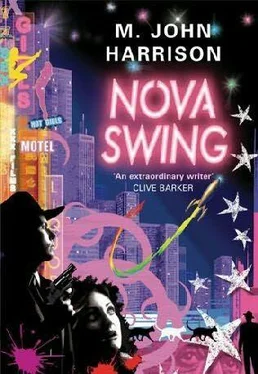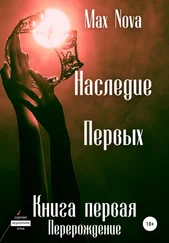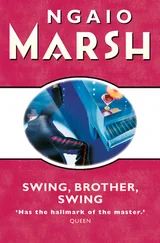"It seems very successful."
"I promised you I wouldn't be sentimental," Edith said, and fetched Liv another drink.
They were joined by Irene and Fat Antoyne, whose first time it was at Le Tango. Anyone would have mixed feelings, was Irene's belief, about returning to a previous stamping ground. She had forgotten, she had to own, what Black Cat White Cat looked like in those past days; though it would always stay mixed up in a part of her life she could not find it in her heart to reject. The fat man, meanwhile, rubbernecked around, then fell into a game of Three Dick Hughie with Nicky the barkeep, so no one knew what he thought. Night drew on. After a few more drinks they left for Carver as a threesome. It was a pity, Edith said as she walked Liv Hula to the door, that it had been too early in the day to get an idea of what a good trade she did.
"Though I never knew it so slow, even at this time."
When they had gone, calling to one another, "Hey, this snow!" in receding voices down the street, she picked up her instrument of choice at that time-a worn old three-row diatonic in pearlescent mint-blue, with a contrasting bellows which revealed in its open phase the ace of hearts, or perhaps a welcoming vulva-and played a few notes. That didn't seem to suit her. She refused another drink. She picked up one of Emil's notebooks she always kept by her, and leafed through it. Five o' clock, a tall woman entered the bar and sat down at a table by the door.
This woman had blonde hair cropped down to nothing much, and a fuck-off way of moving only the heavily tailored can achieve. Some kind of datableed ran oriental-looking ideograms down her arm. She parked a pink 1952 Cadillac roadster at the kerb outside. Known to everyone as a police detective operating out of what used to be called Site Crime, she was a frequent visitor at Le Tango. You also saw her at the fights. She knew the talent, she knew their chops. She knew Straint. She would come by early and stay late. Her order: double Black Heart rocks. She would stare around at the clientele as if they puzzled and amused her in equal parts. This evening she sent Nicky the barkeep away with a smile which said she would probably see him again soon; then nodded over at Edith Bonaventure.
"Good book?" she said. "You're always reading it."
It was a busy night in the end. They had a guest two-piece over from some surf bar down on the Corniche, an old man who'd had himself Zipped to look like Samuel Beckett, a young man in a suit a size too big, keyboards and saxophone, bebop jazz, complicit, clever deconstructions of simple popular tunes, stuff Edith didn't get, but a clear winner with the corporate clientele who came in once a week to hold shouted conversations and spill Giraffe beer. Three a.m. it was all over. The two-piece packed itself away, took its money, melted into the night. Dry snow continued to blow up and down the street outside. It didn't settle. After the barkeep said goodnight and went upstairs, only Edith and the police detective remained. It worked out like that most nights. They sat at their separate tables. Every so often one of them might look up and smile at the other, or go to the door and stare along Straint Street towards the event site. A rocket from the noncorporate port cut the sky like scissors.
A version of Chapter One was published at Amazon.com under the title "Tourism"; a few paragraphs of Chapter Ten appeared in Locus as part of an essay. I'm indebted to Luis Rodrigues, who made me think about saudade; Jukka Halme for the Finnish tango; Zali Krishna, not just a webmaster, but an eye across the manuscript; and Philippa McEwan, who loaned me her house to write in. The Phillips family proved as kind and supportive as ever.
M. John Harrison is the award-winning author of eight previous novels and four collections of short stories. Viriconium was short-listed for the Guardian Fiction Prize and Climbers won the Boardman Tasker Award. His most recent novel, Light, was awarded the James Tiptree Jr. Award and was shortlisted for the 2002 Arthur Clarke Award.












